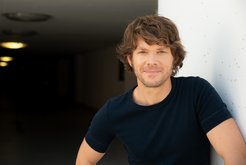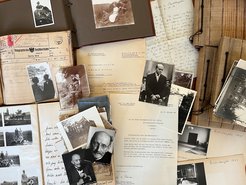The tragic side of the Planck family
Interview with actor and author Steffen Schroeder on his family ties to Max Planck and his novel “Planck oder Als das Licht seine Leichtigkeit verlor” (Planck or When the light lost its lightness)

What fascinates you about Max Planck and why is he still a good role model for young scientists today?
I'm fascinated by his dedication to science, society, and his family. Planck appeared rather undemonstrative, but he was in fact a very loving father – which was by no means a matter of course, especially back then. He was also very modest and self-sufficient. When travelling, for example, he would only travel first-class when accompanied by his family. When travelling alone, he would buy a third-class ticket. He once spent the night sleeping on a bench because, in times of sky-rocketing inflation, his travel funds were no longer sufficient for accommodation after three days. I think we need more dedicated people today without an overinflated sense of self-importance.
Your great-grandmother on your father’s side was a half-sister of Max Planck. Do you remember the moment when you found out that you were related to Max Planck?
Yes, I was a child when I found out. My great-aunt had given me – in addition to a scooter – a two-Deutschmark piece for my birthday. On the back of the coin was a depiction of Max Planck. She told me that he was an ancestor of mine and that I should take good care of the coin. I still have it today.
How did you get the idea for the novel?
My family was always telling stories about Max Planck. When I was a child, my father told me how Planck's life had been over-shadowed by tragedy: his beloved son Erwin, who took part in the plot to assassinate Hitler on 20 July 1944, was imprisoned and sentenced to death by the Nazis. While his son was in prison, the 86-year-old Planck was expected to write a pledge of loyalty to the Führer. How did he feel as a father in this terrible situation? What would I have done in his position? These questions have never left me. I wanted to explore them and find out what exactly happened back then.
For the book, you were able to draw upon private and unpublished sources. How did you come upon these documents?
Many of them are in my family’s possession. I also came across an estate of Erwin Planck and his wife Nelly in a roundabout way, which I was allowed to use for my research.
Which documents did you have at your disposal?

I have some private photo albums: Nelly Planck was an enthusiastic photographer. She worked as a radiologist under Ferdinand Sauerbruch at Berlin’s Charité hospital. She developed the photos in the darkroom at the clinic. The picture on the book cover was also taken by her. There are also a number of letters between Max Planck and his son Erwin, as well as between my grandfather and “uncle” Max. They really helped me to illuminate the family history. One of these letters to my grandfather impressed me as a child. It was framed above the sofa in my grandparents' house. There was a huge inkblot on it and underneath was written in very small letters: “Please excuse the blot.” That brought Planck close to me at an early age.
How much of the novel is fiction?
The book is a factual novel. I included many original quotes and made an effort not to invent anything. There are a few comical scenes – such as the beer-drinking cat at the Charité – which may sound made-up, but that's not the case. I intentionally searched out scenes like this because I believe a novel about such a serious subject also needs a certain lightness. Nelly Planck's later secretary told me about the cat.
Why was it important to you to not just compare the father-son-relationships between your male protagonists, but also to portray strong female characters like Nelly Planck?

Nelly Planck was very modern for her time. She was a doctor, drove a car as early as the 1920s and was very knowledgeable about automobiles. There's a logbook she kept, in which she documented technical details such as oil levels or engine stutters. As the wife of a resistance fighter, her life was difficult. For many Germans, men like her husband were traitors to the fatherland. It wasn't until later that they were seen as heroes. Nelly did not live to see this attitude change, she died in 1975. In my novel, I wanted to give her the place she deserved.
Alongside the history of science, music also plays an important role in your book. Do you play an instrument yourself, like Max Planck and Albert Einstein, who frequently met to play music together?
As a child and teenager, I sang in a choir and played the violin. At some point, I would like to take that up again.
What does the music of Johannes Brahms mean to you? It forms a common thread throughout the book.
I love Brahms' music, it’s very emotional. His works were celebrated as innovative at the time. His Third Symphony, in particular, was a novelty in music history. Max Planck also liked Brahms. He and Einstein often played his pieces, with Erwin accompanying them on the cello.
Steffen, thank you so much for the interview!
Editor’s note: This interview will appear in a printed version in the upcoming issue of our community magazine MaxMag 2/2023.














